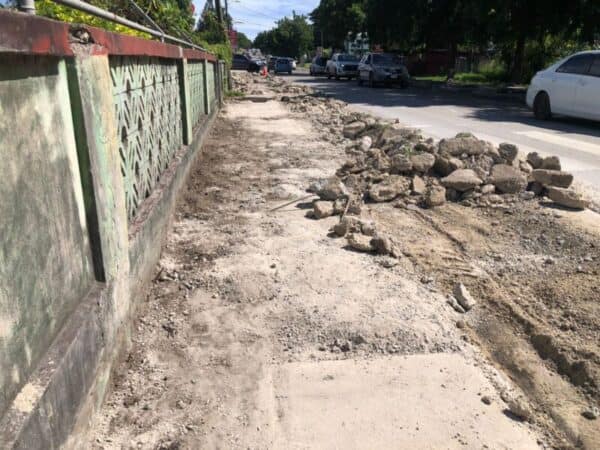
CLICK HERE TO JOIN OUR WHAT’S APP GROUP
Open Proposal to The Hon. Gaston Browne, Prime Minister of Antigua and Barbuda for a Transparent and Accountable Process for Road Infrastructure Financing and Implementation Ensuring Transparency and Best Practices in the Licensing Fee Increase and Road Works Project
The Government of Antigua and Barbuda has announced an impending increase in the licensing fees for vehicles to finance road infrastructure projects. While acknowledging the necessity of road improvements, it is imperative that this process is conducted in a transparent and accountable manner, consistent with best practices. Transparency in financial arrangements, project implementation, and monitoring will enhance public confidence and ensure that resources are allocated efficiently and equitably.
To this end, we Antigua and Barbuda Patriots – a non-political group – respectfully submit the following recommendations and inquiries to facilitate a governance process that upholds the principles of transparency, accountability, and responsible public financial management.
1. Disclosure of Loan Agreement Terms
The Government has indicated that the Antigua Commercial Bank (ACB) and Eastern Caribbean Amalgamated Bank (ECAB) will provide a $100 million loan for roadworks. To ensure fiscal responsibility and public trust, we request the following details be disclosed:
- The specific terms and conditions of the loan, including the interest rate and repayment period.
- clarification on whether interest will be calculated on a reducing balance.
- Identification of the negotiators of the loan agreement and whether a finder’s fee applies, along with details on the recipient of such a fee.
- Publication of the full loan agreement to allow for public scrutiny.
We ask for these details since this tax measure was not included in your Budge 2025 statement that was approved by Parliament, and no figures were provided to inform the nation.
2. Tax Collection and Management

Given that the increased licensing fees will be used to service the loan and fund roadworks, it is essential to establish a clear and transparent framework for tax collection and disbursement. We propose:
- A detailed outline of the tax collection mechanism, specifying collection and which agency will manage the collection and into what designated account will the funds be placed.
- Who will be the designated signatories to this account?
- Monthly publication on a Ministry of Finance website of revenue collection figures and expenditure reports, including details of disbursement amounts and recipients.
3. Procurement and Contracting Process
To ensure fairness and quality in the execution of road projects, a structured procurement process must be implemented. We recommend:
- A clear and publicly available tendering process that specifies qualification criteria for contractors.
- Publication of the list of contractors selected, along with justification for their selection.
- Transparent contract terms that include quality control measures and penalties for non-compliance.
- Independent oversight to ensure adherence to contractual obligations and project timelines.
We know that given your insistence on good governance and accountability with which we fully agree that you would concur with these measures for transparency.
4. Duration and Adjustments of Licensing Fee Increase
Clarification on whether the licensing fee increase is a permanent measure or will be adjusted upon repayment of the loan.
Establishment of a periodic review mechanism to reassess the necessity of the increased fees.
5. Road Usage and Traffic Management
We recommend that a comprehensive study on vehicle usage and road sustainability is essential for long-term infrastructure planning. We propose:
- An assessment of the impact of increased vehicle quantity and weight on the durability of roadways.
- Regulation of heavy-duty vehicle usage on specific roads to prevent premature degradation of infrastructure.
- Development of policies to manage traffic congestion and parking limitations, particularly in high-density areas.
6. Regulation of Vehicle Imports
The past importation of duty-free vehicles contributed to increased traffic congestion and parking challenges, in addition to environmental pollution. To prevent further strain on road infrastructure, we recommend:
- A comprehensive evaluation of past vehicle import policies and their impact.
- Implementation of stricter monitoring measures for future vehicle importation initiatives.
7. Public fora
To allow for citizen participation in this important project, we recommend the establishment of a schedule of public fora at which the public can respond to the published information about this project and ask question and make suggestions. This is the essence of democracy.
Conclusion
By implementing these measures, suggested herein, you, Prime Minister, can reinforce your declared pledge to transparency and accountability, ensuring that public resources, especially those raised by direct taxation of the people, are utilized effectively for the benefit of all citizens.
We trust that you and your administration will consider these recommendations and take the necessary steps to establish a governance framework that is consistent with international best practices. In this way, the Government will build public trust and confidence in its integrity.
CLICK HERE TO JOIN OUR WHAT’S APP GROUP
CLICK HERE TO JOIN OUR WHAT’S APP GROUP
CLICK HERE TO JOIN OUR WHAT’S APP GROUP
CLICK HERE TO JOIN OUR WHAT’S APP GROUP
CLICK HERE TO JOIN OUR WHAT’S APP GROUP
CLICK HERE TO JOIN OUR WHAT’S APP GROUP
Advertise with the mоѕt vіѕіtеd nеwѕ ѕіtе іn Antigua!
We offer fully customizable and flexible digital marketing packages.
Contact us at [email protected]
















Well researched and written. Go to the head of the class. Three problems. First this country is so politically divided that ABLP supporters will agree with anything their World Boss does. Second, the UPPites will do the opposite. So there will never be any real and solid, based on facts and common sense debate, about this issue.
And third is that the PM is a junior Trump. In the words of Dr. Mansoor – he na kaye.
He will do as he likes.
It’s commendable that the government is prioritizing road infrastructure improvements. However, a 40% increase in vehicle licensing fees may be burdensome for many residents.
The proposed fee increase aims to accelerate road repairs, but it’s essential to ensure that the funds are used efficiently and effectively.
Clear communication about the allocation of the increased fees would be beneficial.
They want to increase everything but where is the money going? Not for the road repairs at all….
The 40% increase in licensing fees may be challenging for many residents, Including myself…. Where i am getting money for that… Nonsense!!!!!!!!!!!!!
I don’t trust the government enough to know the increase ins for the right reason.
Why Increasing the Road Licensing Fee is Fair, Equitable, and Essential for Better Infrastructure
The road maintenance and infrastructure development issues are pressing ones, particularly in rapidly growing communities. Roads are the backbone of economic activity, enabling trade, access to essential services, and the overall mobility of citizens. However, maintaining and improving road infrastructure requires substantial and consistent funding. One of the most effective ways to secure these funds is through a fair and equitable increase in road licensing fees for motor vehicles and heavy equipment.
1. The Principle of Fairness in Road Usage
A fundamental principle of fairness in public policy is that those who benefit most from a service should contribute proportionally to its maintenance. Motor vehicles and heavy equipment place significant wear and tear on road networks. Heavier vehicles, in particular, contribute disproportionately to road degradation due to their size, weight, and frequency of use. By increasing licensing fees, vehicle owners contribute fairly to the upkeep of the infrastructure they rely on daily. This ensures that road maintenance costs are not unfairly shifted onto taxpayers who may not even own a vehicle or use the roads as extensively.
2. Addressing the True Cost of Road Infrastructure
Road maintenance and development are expensive endeavors. The Government must allocate significant resources to repair potholes, resurface roads, build bridges, and ensure road safety features are up to standard. Currently, many road networks are suffering from underfunding, leading to poor road conditions that damage vehicles, slowing economic activity, and increase the risk of accidents. A strategic increase in licensing fees ensures that there is a dedicated and sustainable funding source for these critical ongoing and continuous projects.
3. Encouraging Responsible Vehicle Ownership
Another benefit of higher road licensing fees is that they promote responsible vehicle ownership. When fees reflect the real cost of maintaining the roads, owners are incentivized to consider the necessity and efficiency of their vehicles. This could lead to fewer underutilized or poorly maintained vehicles on the road, reducing congestion and environmental impact. Additionally, businesses operating heavy equipment will be encouraged to maintain their fleets properly, further reducing road damage and increasing safety for all road users.
4. Economic and Social Benefits
A well-maintained road network enhances economic productivity by improving logistics, reducing travel time, and lowering vehicle maintenance costs caused by poor road conditions. Reliable roads also increase accessibility to schools, hospitals, and workplaces, contributing to social equity and economic mobility. By ensuring that those who use the roads pay a fair share, we create a system where everyone benefits from improved infrastructure and safer transportation networks.
Conclusion
While any fee increase may face initial resistance, it is essential to recognize that road licensing fees are not just a bureaucratic expense but an investment in a nation’s infrastructure and future. By implementing a fair and equitable increase in these fees, we ensure that road users contribute appropriately to the system they depend on, fostering a more sustainable and efficient transport network for all. The long-term benefits—safer roads, reduced congestion, and economic growth—far outweigh the short-term costs, making this a necessary step toward better infrastructure for everyone.
I wish the PM would make it 100% increase. That will clear the roads of about 5,000 vehicles and at least 4,000 brainless drivers. This way peace and order can return. I am convinced that an IQ and psychological test must be mandatory along with a practical and theoretical test before a person can get a driver’s license.
How about a dedicated gasoline tax. If a dedicated road and bridge tax is placed on petrol as is done in many other Countries.
That solves the problem as those taxes are placed in a locked box: meaning government can’t tap those gasoline taxes even for emergencies. They are dedicated in a trust for road projects only.
Such a system allows for road projects: repair and maintenance to be planned according to the balance and projected tax revenue.
Getting $100 million dollar loan is burden that will be regretted.
When delayed come about which is inevitable with road construction debt burden will be the concern and not roads.
With a dedicated tax based on use revenues can easily be projected and construction processes according.
The loan situation is going to be another albatross around the neck of the working poor.
While I agree the roads need fixing the increase is just too much too soon
the roads need fixing too many potholes everywhere you turn in antigua major problem
That participation is very deserved.
Comments are closed.